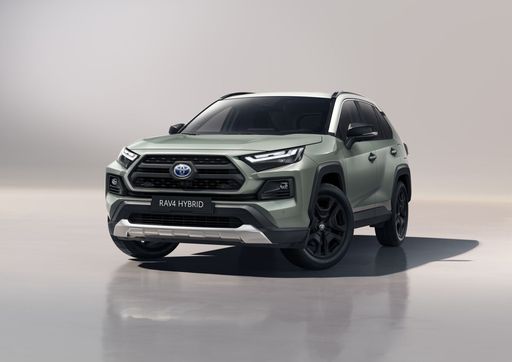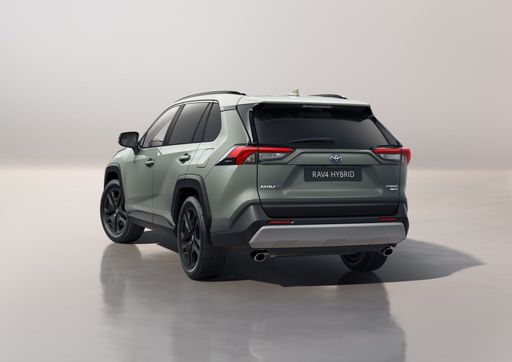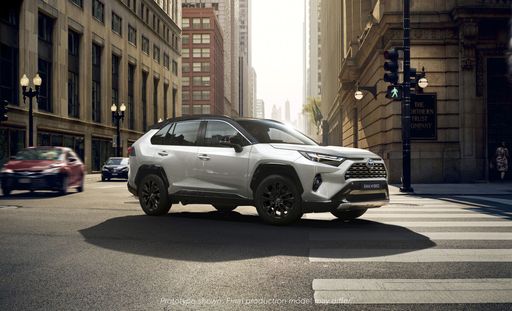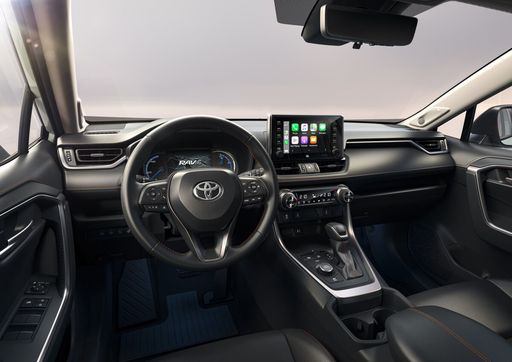Peugeot 208 vs Toyota RAV4 – Differences & prices compared
Compare performance, boot space, consumption and price in one view.
Find out now: which car is the better choice for you – Peugeot 208 or Toyota RAV4?
The Peugeot 208 (Hatchback) comes with a Petrol, Electric or Petrol MHEV engine and Manuel or Automatic transmission. In comparison, the Toyota RAV4 (SUV) features a Full Hybrid or Plugin Hybrid engine with Automatic transmission.
When it comes to boot capacity, the Peugeot 208 offers 352 L, while the Toyota RAV4 provides 580 L – depending on how much space you need. If you’re looking for more power, decide whether the 156 HP of the Peugeot 208 or the 306 HP of the Toyota RAV4 suits your needs better.
In terms of consumption, the values are 14.10 kWh4.50 L per 100 km for the Peugeot 208, and 1 L for the Toyota RAV4.
Price-wise, the Peugeot 208 starts at 20200 £, while the Toyota RAV4 is available from 35100 £. Compare all the details and find out which model fits your lifestyle best!
Peugeot 208
The Peugeot 208 exudes a distinctive French charm, combining sleek lines with an assertive stance on the road. Inside, it offers a modern and sophisticated cabin, complete with intuitive technology and high-quality finishes to enhance the driving experience. Its agile handling and efficient performance make it a delightful choice for both city commuting and longer journeys.
details @ www.media.stellantis.com
@ www.media.stellantis.com
 @ www.media.stellantis.com
@ www.media.stellantis.com
 @ www.media.stellantis.com
@ www.media.stellantis.com
 @ www.media.stellantis.com
@ www.media.stellantis.com
Toyota RAV4
The Toyota RAV4 stands out in the crowded SUV market with its distinct design, embodying a blend of robustness and style. Its cabin provides a harmonious fusion of comfort and practicality, offering plenty of space for both passengers and luggage. This vehicle is engineered to deliver a smooth driving experience, whether manoeuvring through city streets or exploring winding country roads.
details @ Toyota
@ Toyota
 @ Toyota
@ Toyota
 @ Toyota
@ Toyota
 @ Toyota
@ Toyota

|

|
|
|
|
Costs and Consumption |
|
|---|---|
|
Price
20200 - 35100 £
|
Price
35100 - 55700 £
|
|
Consumption L/100km
4.5 - 5.2 L
|
Consumption L/100km
1 - 5.6 L
|
|
Consumption kWh/100km
14.1 - 15.4 kWh
|
Consumption kWh/100km
-
|
|
Electric Range
362 - 432 km
|
Electric Range
75 km
|
|
Battery Capacity
46 - 51 kWh
|
Battery Capacity
-
|
|
co2
0 - 117 g/km
|
co2
22 - 128 g/km
|
|
Fuel tank capacity
44 L
|
Fuel tank capacity
55 L
|
Dimensions and Body |
|
|---|---|
|
Body Type
Hatchback
|
Body Type
SUV
|
|
Seats
5
|
Seats
5
|
|
Doors
5
|
Doors
5
|
|
Curb weight
1165 - 1530 kg
|
Curb weight
1745 - 1910 kg
|
|
Trunk capacity
309 - 352 L
|
Trunk capacity
520 - 580 L
|
|
Length
4055 mm
|
Length
4600 mm
|
|
Width
1745 mm
|
Width
1855 mm
|
|
Height
1430 mm
|
Height
1685 mm
|
|
Payload
380 - 430 kg
|
Payload
390 - 600 kg
|
Engine and Performance |
|
|---|---|
|
Engine Type
Petrol, Electric, Petrol MHEV
|
Engine Type
Full Hybrid, Plugin Hybrid
|
|
Transmission
Manuel, Automatic
|
Transmission
Automatic
|
|
Transmission Detail
Manual Gearbox, Dual-Clutch Automatic
|
Transmission Detail
-
|
|
Drive Type
Front-Wheel Drive
|
Drive Type
Front-Wheel Drive, All-Wheel Drive
|
|
Power HP
101 - 156 HP
|
Power HP
218 - 306 HP
|
|
Acceleration 0-100km/h
8.3 - 10.9 s
|
Acceleration 0-100km/h
6 - 8.4 s
|
|
Max Speed
150 - 200 km/h
|
Max Speed
180 km/h
|
|
Torque
205 - 270 Nm
|
Torque
-
|
|
Number of Cylinders
3
|
Number of Cylinders
4
|
|
Power kW
74 - 115 kW
|
Power kW
160 - 225 kW
|
|
Engine capacity
1199 cm3
|
Engine capacity
2487 cm3
|
General |
|
|---|---|
|
Model Year
2023 - 2025
|
Model Year
2024 - 2025
|
|
CO2 Efficiency Class
D, A, C
|
CO2 Efficiency Class
D, B
|
|
Brand
Peugeot
|
Brand
Toyota
|
Peugeot 208
A Glimpse into the Future: The New Peugeot 208
The Peugeot 208, with its sleek design and innovative features, continues to set benchmarks in the automotive industry. As a hatchback, it seamlessly blends style with practicality, offering the perfect solution for urban driving and long-distance travels alike. In this article, we delve into the technical details and innovations that distinguish the latest iterations of the Peugeot 208.
Engine Options: Efficiency Meets Performance
The Peugeot 208 provides an array of engine options catering to different driving preferences. Featuring both petrol Mild-Hybrid technology and full electric powertrains, it offers a versatile range designed to accommodate eco-conscious drivers as well as those who prioritise performance.
With power outputs ranging from 101 PS to 156 PS, and a torque span of 205 Nm to 270 Nm, these machines are meticulously engineered to provide thrilling yet efficient drives. The petrol versions utilise a three-cylinder 1199 cm³ engine, optimising fuel consumption between 4.7 and 5.4 L/100km, while the electric e-208 models boast an impressive range of up to 410 km on a single charge.
Advanced Transmission Systems
The Peugeot 208 models come equipped with an advanced automatic transmission system, employing either a dual-clutch automatic gearbox or a manual transmission, depending on the chosen variant. These systems guarantee smooth gear transitions, thus enhancing driving pleasure and overall efficiency.
Performance and Environmental Considerations
From a performance standpoint, the Peugeot 208 impresses with its ability to accelerate from 0 to 100 km/h in between 8.3 to 10.9 seconds, depending on the model chosen. This level of performance is complemented by a top speed ranging from 150 to 200 km/h, ensuring that the 208 is more than capable of holding its own on the motorway.
With environmental consciousness at the forefront, the vehicle's CO2 efficiency class ranges from A to D, further establishing the Peugeot 208 as a responsible option for modern drivers keen on reducing their carbon footprint.
Comfort and Practicality: A Class Act
The interior of the Peugeot 208 reflects its exterior's stylish flair. It comfortably seats five passengers and offers a boot capacity of 265 to 309 litres, accommodating both city commutes and weekend getaways. Advanced comfort features and a state-of-the-art infotainment system ensure that rides are as enjoyable for passengers as they are for the driver.
Cost Considerations
The Peugeot 208 manages to strike a remarkable balance between cost efficiency and luxury. With prices ranging from €22,950 to €40,825, there is a variant to suit most budgets while still providing a premium experience. Additionally, the monthly costs and costs per kilometre are kept in check, making it an economically sound choice in the long term.
Dimensions and Design: Compact yet Spacious
Measuring 4,055 mm in length, 1,745 mm in width, and 1,430 mm in height, the Peugeot 208 maintains a compact profile that is perfectly suited to tight urban environments. Despite its manageable size, it offers ample space inside, thanks in part to clever design and engineering.
Conclusion: A Future-Proof Choice
The Peugeot 208 is a testament to modern automotive innovation. Whether powered by traditional engines or fully electric powertrains, it consistently delivers on performance, efficiency, and style. The combination of cutting-edge technology and sustainable practices places the Peugeot 208 as a forward-thinking choice for drivers seeking a vehicle that epitomises the best of contemporary motoring.
Toyota RAV4
The Toyota RAV4: A Modern Marvel in the SUV Segment
The Toyota RAV4 has long been a staple in the SUV market, renowned for its reliable performance and innovative design. In the latest iterations, Toyota continues to build on this legacy by integrating advanced technology and superior engineering.
Hybrid Excellence: Under the Hood
The latest RAV4 models are equipped with impressive hybrid engines, offering both full-hybrid and plug-in hybrid options. The performance spectrum ranges from 218 to a staggering 306 PS, providing power without compromising efficiency. These engines are paired with a responsive CVT automatic transmission, delivering a smooth driving experience.
The hybrid variants achieve remarkable fuel efficiency, with consumption rates as low as 1.0 to 5.6 litres per 100 kilometres, depending on the model. Additionally, the plug-in hybrid versions boast an impressive electric-only range of up to 75 kilometres.
Performance Meets Practicality
The Toyota RAV4 is not just about power; it also offers practical features that enhance the driving experience. With a top speed of up to 180 km/h and a rapid acceleration capability of 0-100 km/h in just 6 to 8.4 seconds, it combines the thrill of driving with everyday usability.
The spacious interior comfortably seats five, with a generous boot capacity ranging from 520 to 580 litres, making it ideal for family adventures or long road trips.
Innovative Driving Dynamics
One of the RAV4's standout features is its driving dynamics. Available in both front-wheel and all-wheel drive, the all-wheel drive variants, branded as AWD-i, offer enhanced traction and stability, providing peace of mind in various driving conditions.
Furthermore, Toyota has ensured that the RAV4 caters to diverse tastes and preferences, with several trim levels like the Adventure AWD-i, Business Edition, and the sporty GR SPORT AWD-i, offering unique features and styling options.
Eco-Friendly and Cost Effective
Environmental considerations are central to the RAV4 design philosophy. The model range adheres to strict CO2 emission standards, rated between 22 and 128 g/km, placing it in the B to D CO2 efficiency classes.
Moreover, the running costs of the RAV4 reflect its excellent efficiency, with monthly expenses ranging from €1,068 to €1,315, and cost per kilometre between 42.7 and 52.6 cents, making it a sensible choice for eco-conscious drivers.
Conclusion: The RAV4's Unmatched Appeal
Whether you're a city driver or an adventure seeker, the Toyota RAV4 offers a perfect blend of power, efficiency, and practicality. Its state-of-the-art hybrid technology, coupled with its versatile features, truly sets it apart in the competitive SUV market. With the Toyota RAV4, drivers experience the best of both worlds: exceptional performance and eco-friendly innovation.
The prices and data displayed are estimates based on German list prices and may vary by country. This information is not legally binding.
